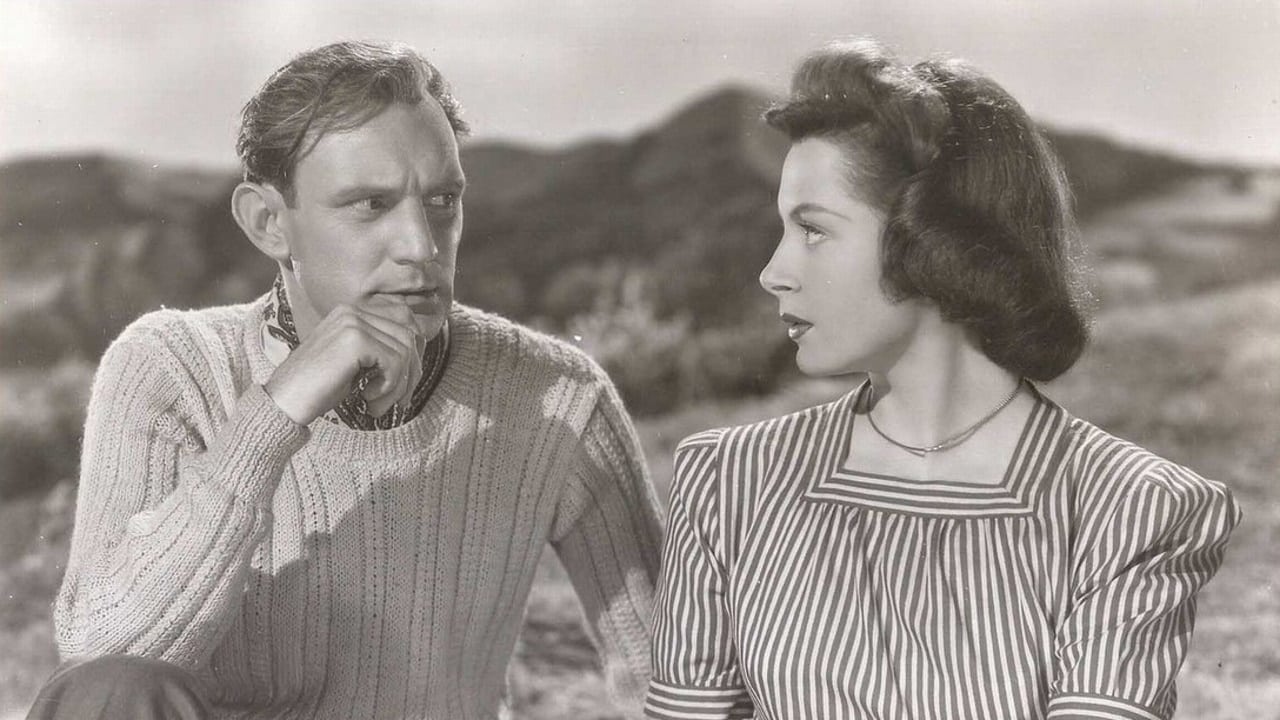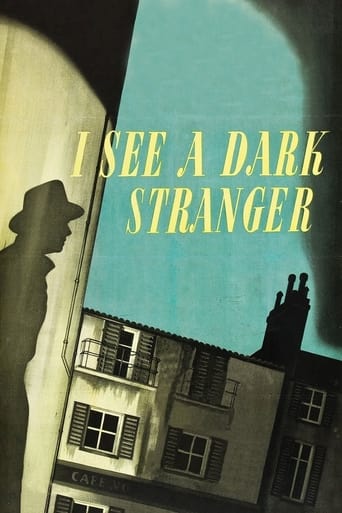Jay Raskin
Most of the things I felt about the film were nicely expressed by the favorable reviewers I read, especially the ones from the U.K.. I remember Deborah Kerr from "the King and I," and sort of remember Trevor Howard from "Mutiny on the Bounty," the excellent 1962 version with Marlon Brando. It was nice to see them much younger in this 1946 film. I agree with the viewers that said this movie was witty, full of surprises and twists and turns and had a beautiful performance from a younger and very beautiful Deborah Kerr. I agreed with the negative criticism of the film that it is a bit long and the plot gets muddled a few times. In its defense, the movie does manage to unmuddle itself the numerous times that it strays from the beaten path. If you like movies that break formulas so much that you can't trust the narration, this is a joy. Actually the narrator tells you in the very beginning of the movie what to expect from the film when he says that he has chosen the wrong place to start his tale and restarts it at a completely different place. Thanks to all the U.K. and other reviewers who filled us in on the many historical and other references in the film.
GusF
One of the first films concerning D-Day, this is a very entertaining spy thriller written by Frank Launder (who also directed) and Sidney Gilliat. It is the only film that I ever seen dealing with the issue of the Irish Free State's neutrality in World War II, albeit somewhat indirectly, and the only one that I am even aware of so this Irishman found it very interesting on that score, particularly since my PhD thesis concerns Irish society and the way that it shaped Irish law from the 1920s to the 1940s. The film's first half was certainly its strongest as I found the introduction of the bumbling Goodhusband and the more competent Spanswick to be slightly distracting. When they arrived on the scene, it became something of a farce as opposed to a thriller with some comedic elements. The film bears some superficial similarities to Launder and Gilliat's earlier and better written film "The Lady Vanishes". Goodhusband and Spanswick are essentially less funny versions of Charters and Caldicott.Deborah Kerr is wonderful in the lead role of Bridie Quilty, an extremely nationalistic 21-year-old Irishwoman who was raised on a diet of her late father's tall tales about his alleged participation in the 1916 Rising and the Irish War of Independence. Taking the old Fenian motto "England's difficulty is Ireland's opportunity" to heart, she attempts to join the IRA. However, she is rebuked by Michael O'Callaghan, a former senior republican who has become the curator of an art gallery, who now believes that peaceful, constitutional means should be employed in Anglo-Irish relations. I don't know if he was based on any Irish figure in particular but this was a fairly common story among less radical members of the republican elite in 1940s Ireland, many of whom were or had been in government. Her dreams of joining the IRA dashed, she becomes a spy for the Nazis. In spite of this, however, Bridie remains a sympathetic character as it is clear that she is essentially a good person and that her romanticised ideas about Ireland and fighting the British are being manipulated by the British fascists in the Germans' employ. While I doubt that any of them were as naive as Bridie, this is based on the fact that there was cooperation between IRA members and the Abwehr, the Nazi intelligence service, during the war. Kerr's Irish accent is absolutely pitch perfect in every respect. I have never heard a better Irish accent in any film or TV series, which is refreshing that since many of them are very bad.The quintessential Englishman Trevor Howard is very good as David Baynes, a British Army officer to whom Bridie takes an instance dislike for the sole reason of his nationality. Things get even worse when she discovers that he is writing his thesis on Oliver Cromwell, easily the most hated figure in Irish history. Kerr and Howard have great chemistry and their combative relationship is joy to watch. However, over the course of the film, Bridie comes to appreciate that the British are not all bad as she and David gradually fall in love. She comes into the possession of information concerning the location of the D-Day landings which she was supposed to pass on to the Germans but she decides against it after she realises that she would responsible for the deaths of thousands of British and, more importantly to her, Irish soldiers. The film features great appearances from Raymond Huntley, Brefni O'Rourke, Norman Shelley, David Tomlinson, Joan Hickson and George Woodbridge. With the exception of Bridie herself, all of the Irish characters are played by Irish actors and I appreciated that even though none of them have a big role. I have to say though that I'd have preferred if David Niven had been the male lead since he was a better actor than Howard. Plus he was even more quintessentially English! The film does an excellent job at capturing the colloquialisms of Irish English such as beginning sentences with "ara" when disagreeing with someone and saying "at all at all." These days, such expressions are typically only used by older people, particularly ones from rural areas, but they were considerably more common when the film was made and set. The early and closing parts of the film were actually shot in Ireland, specifically Dublin, Wexford and Louth. When it came to the Dublin scenes, I saw numerous places that I recognised such as the exterior of Heuston Station (or Kingsbridge Station as it was then) and O'Connell Street. The former has not changed since the building was already a century old by then but O'Connell Street has changed quite a bit. Most notably, Nelson's Pillar, which was destroyed by the IRA in 1966, is clearly visible. It also features references to Raidio Éireann, the precursor to RTÉ, and well known Irish figures such as Padraig Pearse, James Connolly, J.M. Synge and Jack B. Yeats. Considering that I don't typically watch Irish films or TV (bar current affairs) since most of them aren't very good, it is a bit of a novelty to hear these things mentioned in a film or, for that matter, to see places that I visit on a regular basis.Overall, this is a very good film but it would have been an even better one if it had maintained its more serious tone throughout rather than introducing more farcical elements. The ending is a little silly. Incidentally, of the three D-Day related films that I have watched in the last two months, this is the only one not to feature an actual D-Day veteran in the cast as Richard Todd appeared in "The Longest Day" and James Doohan appeared in "36 Hours".
edwagreen
Deborah Kerr was 24 when she made this 1947 film. The N.Y.C. film critics loved Miss Kerr. She won the best actress award that year for this film as well as the equally awful "Black Narcissus."Deborah is Bridie Quilty in this film. Need I say more? She is an Irish lass with the tongue and brogue of Maureen O'Hara. She has been taught to hate the British despite the fact that there had been a 1921 peace treaty in Ireland.By 1944 in the film, at age 21, she is out to make her own way in life and soon gets caught up in a Hitchcock-like thriller with German spies, etc.The film is a bit confusing and dull to say the least. After finding the book, Bridie changes her ideas since she sees what the Nazis will do to both the British and Irish alike.The ending becomes basically slapstick and annoying to watch. The very end is even more ridiculous as well. This film was also known as "The Adventuress."
bkoganbing
I See a Dark Stranger finds Deborah Kerr as Irish colleen Bridie Quilty trying to get even with the English for all manner of deprivations visited on her people. Unfortunately she's born during World War II and her own government is scrupulously maintaining its neutrality because they recognize a Nazi victory wouldn't be good for them either.Deb's been brought up on tales of the Rebellion of 1916 by her family and her first attempt to join the Irish Republican Army by that time an illegal group meets with a rebuff. She looks up an old IRA fighter whose name Dad's dropped for years and finds he's now a museum curator and a believer in the constitutional and diplomatic solutions for remaining problems with the British. Brefni O'Rourke plays Michael Callaghan the old Irish freedom fighter who tries to disillusion Deborah with no success.She doesn't give up so easily and before long she's really in over her head involved with Nazi spies headed by Raymond Huntley. But she also has a British officer, Trevor Howard, who does convince her in the end that not all the British are Oliver Cromwell while falling for her at the same time.I See A Dark Stranger was well received in its day, but I think it has a problem of varying degree of mood that isn't explained. The film can't seem to make up its mind as to just how light hearted the story should be. It should have come down on one side or the other.Still Deborah makes a spirited Bridie and this film together with Black Narcissus are the ones responsible for her going to Hollywood and a long term and honored career which sad to say was not rewarded with an Oscar except a life time achievement one. Trevor Howard is a stalwart leading man and Tom McCauley and Garry Marsh play a couple of Colonel Blimps in training on the Isle of Man who nearly steal the film.

